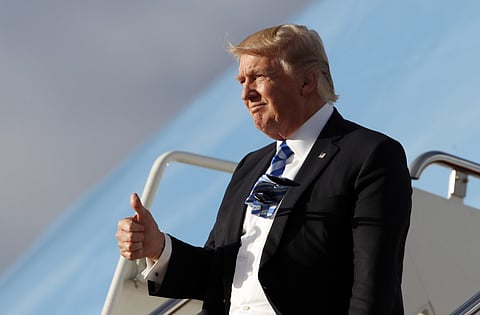Is Trump acting more rational lately?
The US president’s attachment to any particular position is flimsy because he lacks any coherent worldview

The question of the moment is what to make of the normalisation of President Donald Trump. Not normalisation in the way used by the Trump resistance — to argue against becoming inured to unacceptable behaviour. But normalisation of Trump in the usual sense of the term: that Trump is, if not behaving normally, at least adopting normal positions.
Nato is “no longer obsolete”. China was a currency manipulator and would be branded as such in the Trump administration; now, never mind. Syria was not an American problem; now its behaviour is America’s, and Trump’s, “responsibility,” and Bashar Al Assad is a “butcher”. The Export-Import Bank, once bad, is now good; same, maybe, with Federal Reserve Chair Janet Yellen.
These about-faces represent, in part, a Trump Tower-size version of the realities that confront any new president. Campaign trail proclamations yield to Oval Office sobriety. That’s not only to be expected — it should, for the most part, also be welcomed.
Bill Clinton vowed to revoke trade privileges with China because of its human rights abuses; in office, he found himself renewing China’s most-favoured-nation status, proclaiming, “I think we have to see our relations with China within a broader context.” George W. Bush promised to usher in an era of “humble” foreign policy and to “stop extending our troops all around the world in nation-building missions.” You remember what happened next.
Barack Obama criticised rival Hillary Clinton’s health care proposal because “it forces everyone to buy insurance,” then crafted a plan with, yes, an individual mandate. Health care turned out to be complicated — perhaps not more than Obama knew, but more than he was willing to admit on the campaign trail. Indeed, Obama underwent the same transformation as Trump on the Export-Import Bank, which as a candidate Obama derided as “little more than a fund for corporate welfare.”
Of course, Trump’s dizzying string of policy pirouettes is different from the evolving positions of his predecessors. None of them flipped so much, so soon. That’s not surprising. Trump’s learning curve is steeper. His attachment to any particular position is especially flimsy because he lacks any coherent worldview; his guiding ideology involves only the promotion of Trump.
And the ever-shifting cast of Trump whisperers — Jared Kushner is up, Stephen K. Bannon is down — means that what policy prevails in a given week could be upended with the next tweet. Even with a weather vane, you won’t necessarily know which way the Trump wind blows.
So no one should count on the current spate of Trump’s good judgement to continue. Indeed, to call this past week one of good judgement is to ignore concurrent events. While our attention was focused on Mellow Trump, Attorney-General Jeff Sessions was busy reviving a misguided war on drugs, dismantling consent decrees with police departments and cruelly ramping up deportations.
Yet there are reasons to exhale, ever so slightly. The functioning of the federal courts and the dysfunctioning of the legislative branch have worked, so far, to stymie much of the Trump agenda.
A president’s greatest powers, and therefore greatest threat, lie in the arena of foreign affairs. Here, the troika of Defence Secretary Jim Mattis, Secretary of State Rex Tillerson and National Security Adviser H.R. McMaster has emerged to present an effective brake on the mercurial president, especially comforting as the North Korea threat looms. A White House with Michael Flynn gone and Bannon neutered is a better place, and the country is safer for it. Adults are in the (situation) room.
And Trump, notwithstanding the vastness of his policy ignorance and his evident distaste for remedying that embarrassment, is learning. He has moved from “I alone can fix it” to “Nobody knew that health care could be so complicated.” Neither statement is true, but the second at least evinces a dawning rationality.
Likewise, Trump’s recounting of his conversation with Chinese President Xi Jinping, who seems to have had more success than intelligence briefers at getting the attention-impaired president to sit through a lecture on the region.
“He then went into the history of China and Korea,” Trump told the Wall Street Journal. “And Korea actually used to be part of China. And after listening for 10 minutes I realised that not — it’s not so easy.”
No, it isn’t. Previous administrations weren’t full of “stupid people making bad deals.” They were staffed, for the most part, by smart people diligently navigating complex situations. If that is beginning to dawn on Trump, however belatedly, we should be relieved. It is possible both to resist the new normal and to give thanks that, for now anyway, it is not far worse.
— Washington Post
Ruth Marcus is a columnist for The Post, specializing in American politics and domestic policy.


